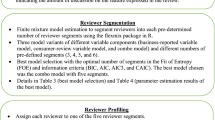Abstract
Peer endorsement systems (PES), systems for the collection and presentation of online product reviews represent a new and increasingly common sight on many e-Commerce websites. The number of reviews and scope of data presentation made possible by PESs pose demands on the information processing abilities of a typical customer. This study posits that differences in PES design based on quality and presentation of online customer reviews can impact user perceptions about whether they are getting “the whole story” about a product. Drawing on economic regret theory, we develop a theoretical model to test the impact of PES design on consumer’s decision confidence and post-choice regret. We conduct an expost experimental analysis of two competing PES interfaces and show that key differences in PES design have a surprising and relevant impact on the way in which data from that interface is perceived and used by customers in the online decision-making process.
Access this chapter
Tax calculation will be finalised at checkout
Purchases are for personal use only
Preview
Unable to display preview. Download preview PDF.
Similar content being viewed by others
References
Keller, K.L., Staelin, R.: Effects of quality and quantity of information on decision effectiveness. Journal of Consumer Research 14(2), 200–213 (1987)
Ho, J., Tang, R.: Towards an optimal resolution to information overload: an infomediary approach. In: Proceedings of the 2001 International ACM SIGGROUP Conference on Supporting Group Work, pp. 91–96. ACM, New York (2001)
Liang, T.P., Kai, H.J., Ku, Y.C.: Personalized content recommendation and user satisfaction: Theoretical synthesis and empirical findings. Journal of Management Information System 23(3), 45–70 (2007)
Ng, V.W.K., Chyi, H.I.: The Effects of Context Clutter and Advertising Repetition on Attitudinal and Behavioral Changes toward an Online Advertisement. Embedding Into Our Lives: New Opportunities and Challenges of the Internet 145 (2008)
Mudambi, S.M., Schuff, D.: What makes a helpful Online Review? A study of customer reviews on Amazon.com. MIS Quarterly 34(1), 185–200 (2010)
Hu, M., Liu, B.: Mining and summarizing customer reviews. In: Proceedings of the Tenth ACM SIGKDD International Conference on Knowledge Discovery and Data Mining, pp. 168–177. ACM, New York (2004)
Hu, N., Pavlou, P., Zhang, J.: Can online reviews reveal a products true quality. In: Proceedings of ACM Conference on Electronic Commerce (EC 2006) (2006)
Chevalier, J.A., Mayzlin, D.: The effect of word of mouth on sales: Online book reviews. Journal of Marketing Research 43(3), 345–354 (2006)
Bhattacharjee, S., Gopal, R.D., Lertwachara, K., Marsden, J.R.: Consumer search and retailer strategies in the presence of online music sharing. Journal of Management Information Systems 23(1), 129–159 (2006)
Loomes, G., Sugden, R.: Regret theory: An alternative theory of rational choice under uncertainty. The Economic Journal 92(368), 805–824 (1982)
Bell, D.E.: Regret in decision making under uncertainty. Operations Research 30(5), 961–981 (1982)
Tsiros, M., Mittal, V.: Regret: A model of its antecedents and consequences in consumer decision making. Journal of Consumer Research 26(4), 401–417 (2000)
Zeelenberg, M.: Anticipated regret, expected feedback and behavioral decision making. Journal of Behavioral Decision Making 12(2), 93–106 (1999)
Das, N., Kerr, A.H.: ”Woulda, Coulda, Shoulda”: A Conceptual Examination of the Sources of Post-choice Regret. The Journal of Marketing Theory and Practice 18(2), 171–180 (2010)
Hung, S.Y., Ku, Y.C., Liang, T.P., Lee, C.J.: Regret avoidance as a measure of DSS success: An exploratory study. Decision Support System 42(4), 2093–2106 (2007)
Baskerville, R., Pries-Heje, J., Ramesh, B.: The enduring contradictions of new software development approaches: a response to Persistent Problems and Practices in ISD. Information Systems Journal 17(3), 241–245 (2007)
Hevner, A.R., March, S.T., Park, J., Ram, S.: Design science in information systems research. Mis Quarterly 28(1), 75–105 (2004)
Pries-Heje, J., Baskerville, R., Venable, J.: Strategies for design science research evaluation. In: Proceedings of the 16th European Conference on Information Systems, pp. 255–266 (2004)
Kumar, N., Benbasat, I.: Research Note-The Influence of Recommendations and Consumer Reviews on Evaluations of Websites. Information Systems Research 17(4), 425 (2006)
McKinney, V., Yoon, et al.: The measurement of web-customer satisfaction: An expectation and disconfirmation approach. Information Systems Research 13(3), 296 (2002)
Simonson, I.: The influence of anticipating regret and responsibility on purchase decisions. Journal of Consumer Research 19(1), 105–118 (1992)
Tan, C.H., Yang, X., Teo, H.H., Lin, G.: An Empirical Investigation of the Auction Buyer’s Choice to Buy Out or Bid: Cry of Regret or Laugh of Satisfaction? In: Proceedings of ICIS 2005, vol. 62 (2005)
Qin, L., Gulati, A., He, L., Fang, W.: Adverse Selection for Luxury Goods in Online Auctions. Journal of Internet Commerce 8(3), 268–287 (2009)
Dave, K., Lawrence, S., Pennock, D.M.: Mining the peanut gallery: Opinion extraction and semantic classification of product reviews. Proceedings of the 12th international conference on World Wide Web. ACM, 528 (2003)
Kwaifunip, R., Wagner, C.: Weblogging: A study of social computing and its impact on organizations. Decision Support Systems (45), 242–250 (2008)
Jiang, Z.: The effects of presentation formats and task complexity on online consumers. MIS Quarterly (2007)
Author information
Authors and Affiliations
Editor information
Editors and Affiliations
Rights and permissions
Copyright information
© 2011 Springer-Verlag Berlin Heidelberg
About this paper
Cite this paper
Church, M., Iyer, L. (2011). Experimental Evaluation of Peer Endorsement System Artifacts Using Best-of-Breed Ideals – Effects of Online Decision Confidence on Post-choice Regret. In: Jain, H., Sinha, A.P., Vitharana, P. (eds) Service-Oriented Perspectives in Design Science Research. DESRIST 2011. Lecture Notes in Computer Science, vol 6629. Springer, Berlin, Heidelberg. https://doi.org/10.1007/978-3-642-20633-7_19
Download citation
DOI: https://doi.org/10.1007/978-3-642-20633-7_19
Publisher Name: Springer, Berlin, Heidelberg
Print ISBN: 978-3-642-20632-0
Online ISBN: 978-3-642-20633-7
eBook Packages: Computer ScienceComputer Science (R0)




